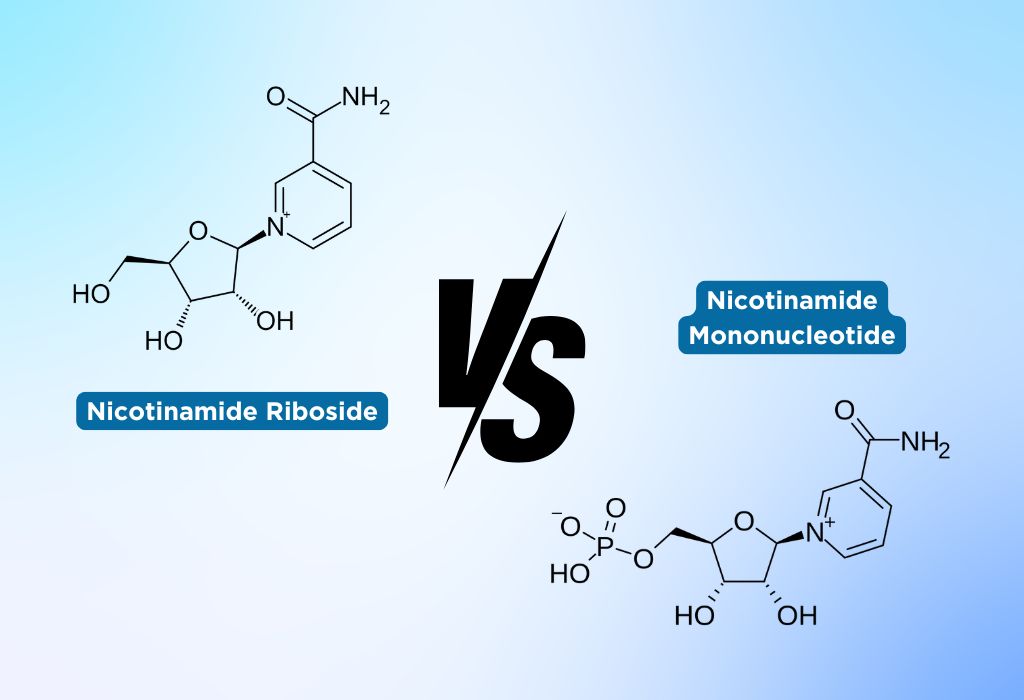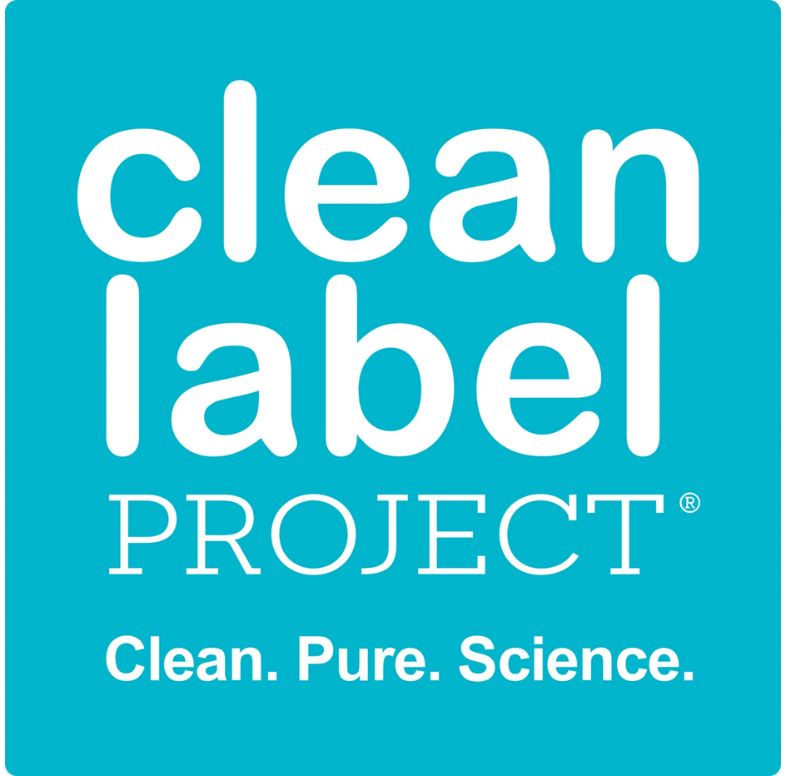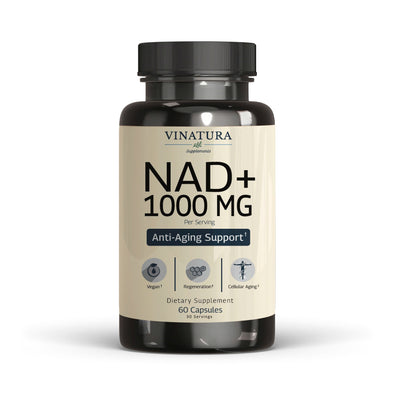
NR vs. NMN: Which is Better & How to Take Them Together?
Nicotinamide Riboside (NR) and Nicotinamide Mononucleotide (NMN) have recently attracted significant attention in the health and nutrition community. Both are known as precursors that convert into NAD+, an essential molecule involved in many fundamental biological processes in the body. However, NMN offers higher absorption efficiency than NR. Details on the differences and the potential combination of these two precursors will be discussed below.
Before exploring further, please read the disclaimer located at the end of this webpage.
Key Takeaways
- NMN has more effective absorption and NAD+ synthesis than NR.
- NMN directly converts to NAD+, while NR needs to be converted to NMN with the help of NMNAT before fully producing NAD+.
- NMN and NR can be used together, but more research is needed.
- NMN is suitable for those who need rapid NAD+ enhancement. At the same time, NR provides more scientific evidence of the safety of this function in humans.
What Is NMN? How Does It Work?
Nicotinamide Mononucleotide (NMN) is a precursor to Nicotinamide Adenine Dinucleotide (NAD+). It is a natural molecule found in every living cell in the body, belonging to the nucleotide class. It is one of the building blocks of RNA and DNA.
NMN directly converts into NAD+, thereby increasing NAD+ levels. It is also known as an NAD+ booster. Scientifically, NMN is an important signaling molecule with a system that maintains the biological robustness of the NAD+ support network [1].
Once introduced into the body, NMN is quickly absorbed and converted into NAD+, contributing to increased NAD+ synthesis, inhibition of age-related adipose tissue inflammation, increased insulin secretion, improved mitochondrial function, and enhanced neuronal function in the brain [2].
What Is NR? How Does It Work?
Nicotinamide Riboside (NR) is an essential precursor to Nicotinamide Adenine Dinucleotide and is a form of Vitamin B3 with potential health benefits in increasing NAD+ levels in the body.
After entering cells, NR rapidly participates in phosphorylation processes through the action of nicotinamide riboside kinases (NRK1 and NRK2) to form Nicotinamide Mononucleotide (NMN). Then, NMN bypasses previous biosynthetic pathways to produce NAD+ with NMN-adenylyltransferase (NMNAT) [3].
Research provides evidence of NR's health benefits from animal and human studies, supporting its role in cardiovascular disorders, neurodegeneration, metabolism, muscle and kidney injuries, aging, and chemotherapy [4].
Is Nicotinamide Riboside The Same As NMN?

Nicotinamide Riboside (NR) and Nicotinamide Mononucleotide (NMN) are essential precursors that convert into NAD+. They are chemically similar, except for a phosphate group found only on NMN.
A study published in Nature Communications in 2016 on NMN metabolism in mammalian cells showed that this additional phosphate group is the main reason NMN cannot enter cells directly, whereas NR can. This phosphate group must be removed from NMN to convert it into Nicotinamide Riboside (NR) to enter the cell [5].
What Is The Relationship Between NMN And NR?
The primary relationship between NMN and NR is that both are effective precursors for converting into NAD+, a coenzyme in all living cells, which directly participates in brain activities, maintains cellular function, and slows the aging process.
NMN and NR can work together. The body converts NMN into NR, which then enters cells and is converted back into NMN by an enzyme called Nicotinamide Riboside Kinase (NRK) [6].
NR vs. NMN: What's The Difference Between Them?
Although NR and NMN are chemically similar, there are several differences between them, as summarized in the table below:
| Criteria | NR | NMN |
| Chemical Structure | A ribose sugar molecule + nicotinamide | A ribose sugar molecule + nicotinamide + phosphate group |
| Metabolic Pathway | NR → NMN → NAD+ | NMN → NAD+ |
| Size | Smaller | Larger |
| Absorption Efficiency | More effective | Less effective due to size and cell membrane limitations |
| Scientific Research | Extensive research | Limited research |
NAD Glossary Of Terms
If you are studying NAD+ supplements, you may have encountered related terms such as NAD, NADH, and NADP+. Below is a glossary of NAD-related terms you may find useful:
| Term | Definition |
| NAD (Nicotinamide Adenine Dinucleotide) | A coenzyme present in all living cells, playing a crucial role in energy production, metabolism, and other biological processes. |
| NAD+ | The oxidized form of NAD |
| NADH | The reduced form of NAD |
| NADP+ (Nicotinamide Adenine Dinucleotide Phosphate) | A variant of NAD+ with an additional phosphate group. |
| Enzyme | A complex protein that accelerates biochemical reactions, either building or breaking down other molecules. |
| Coenzyme | A substance that enhances the activity of an enzyme. It is an organic molecule that binds with a protein molecule to form an active enzyme. |
| Precursor | A substance from which another substance is formed, especially through metabolic reactions. |
What Is Better: NR or NMN?

Both NR (Nicotinamide Riboside) and NMN (Nicotinamide Mononucleotide) are alternately featured in supplements designed to boost NAD+ levels. However, users often have questions about the safety and effectiveness of these two precursors:
- Safety: Both are considered safe for short-term use in reasonable doses.
- Effectiveness: NMN is a direct precursor to NAD+, making it more efficient in conversion than NR.
- Scientific Research: NR has more scientific studies supporting its use than NMN.
- Cost: Both NR and NMN tend to be quite expensive.
Should I Take NMN or NR?
Choosing between NR and NMN to boost NAD+ levels depends on your health goals, preferences, and considerations:
- Choose NR if you want a well-researched, reputable source of NAD+ that ensures safety and effectiveness in elevating NAD+ levels.
- Choose NMN to ensure direct and potentially more efficient NAD+ enhancement. NMN is a direct precursor and can participate in the conversion process without additional transformations.
Ultimately, the choice is yours. Consult a healthcare professional before starting new supplements, especially NMN and NR. Additionally, compare your body's response to each precursor to find the most suitable option.
Can You Take NMN and NR Together?
Currently, no information indicates harm from using NMN and NR together. However, no scientific evidence has proven that combining them is effective or safe.
Some sources suggest combining NMN and NR might be a great way to enhance NAD+ across various cell types, as each type might respond differently to different precursors. However, some users report that combining NMN and NR did not provide additional benefits compared to using NR alone and recommend using NMN for its stability and effectiveness.
Experts have not verified these claims, so consider their reference points and consult a healthcare provider for accurate advice.
How To Take NMN and NR Together?
As mentioned above, the effectiveness of combining NMN and NR has yet to be established, and there is no information on the optimal dosage or combination method.
What we can provide are general guidelines for the individual use of each precursor to achieve optimal NAD+ enhancement:
- For NMN: 250-1200 mg daily in the morning, depending on health needs.
- For NR: 250-300 mg daily, depending on health needs.
Conclusion
In summary, NR and NMN are NAD+ precursors, a vital substance for many fundamental biological processes in the body. While similar, NR and NMN differ significantly in their mechanisms and effectiveness. It is essential to adhere to dosage recommendations and consumer guidelines when using any supplement. Don't hesitate to seek medical advice to ensure safety.
References
- [1] Imai, Shin-ichiro. "The NAD World 2.0: The Importance of the Inter-Tissue Communication Mediated by NAMPT/NAD+/SIRT1 in Mammalian Aging and Longevity Control." Npj Systems Biology and Applications, vol. 2, no. 1, 18 Aug. 2016, https://doi.org/10.1038/npjsba.2016.18. Accessed 16 Mar. 2022.
- [2] Shade, Christopher. "The Science behind NMN-A Stable, Reliable NAD+Activator and Anti-Aging Molecule." Integrative Medicine (Encinitas, Calif.), vol. 19, no. 1, 2020, pp. 12–14, www.ncbi.nlm.nih.gov/pmc/articles/PMC7238909/#ref6. Accessed 26 Aug. 2024.
- [3] Fletcher, Rachel S, and Gareth G Lavery. "The Emergence of the Nicotinamide Riboside Kinases in the Regulation of NAD+ Metabolism." Journal of Molecular Endocrinology, vol. 61, no. 3, Oct. 2018, pp. R107–R121, https://doi.org/10.1530/jme-18-0085. Accessed 13 Dec. 2022.
- [4] Mehmel, Mario, et al. "Nicotinamide Riboside—the Current State of Research and Therapeutic Uses." Nutrients, vol. 12, no. 6, 31 May 2020, p. 1616, https://doi.org/10.3390/nu12061616.
- [5] Ratajczak, Joanna, et al. "NRK1 Controls Nicotinamide Mononucleotide and Nicotinamide Riboside Metabolism in Mammalian Cells." Nature Communications, vol. 7, no. 1, 11 Oct. 2016, www.nature.com/articles/ncomms13103, https://doi.org/10.1038/ncomms13103.
- [6] ---. "The Science behind NMN-A Stable, Reliable NAD+Activator and Anti-Aging Molecule." Integrative Medicine (Encinitas, Calif.), vol. 19, no. 1, 2020, pp. 12–14, www.ncbi.nlm.nih.gov/pmc/articles/PMC7238909/#:~:text=NMN%20and%20NR%20dance%20together. Accessed 26 Aug. 2024.
Author

Product Disclaimer
Including an ingredient or study does not evaluate, endorse, or recommend any Vinatura product or any third-party product. Some ingredients discussed may not be used in any Vinatura product.
The content of the articles has not been evaluated by the Food and Drug Administration (FDA) and is not intended to promote or endorse any specific product. Any products sold on this website are not intended to diagnose, treat, cure, or prevent any disease.
Opinions and Endorsements
Any claims, statements, or opinions expressed in the articles are those of the author(s) and do not necessarily reflect the views or opinions of the manufacturers of the dietary supplement products. The products sold on this website are separate from the content of the articles and are not directly endorsed or associated with the information presented here.
Liability Disclaimer
The author(s) of the articles, website, and manufacturers of the dietary supplement products do not assume any liability for any potential consequences arising from the use of the information provided in the articles. Ingredient effects, dosages, and safety vary by individual, formulation, and context; some ingredients interact with medications or may be unsuitable during pregnancy or lactation. It is recommended that individuals consult with a qualified healthcare professional before making any dietary or lifestyle changes, including the use of dietary supplements.
Product Usage
Please refer to the product labels and packaging for specific usage instructions and guidelines for the dietary supplement products sold on this website.
Customer Support
For any concerns or questions regarding the dietary supplement products, please contact our customer support team, who will be more than happy to assist you.






Leave a Comment
Be the first to comment.
What do you think?